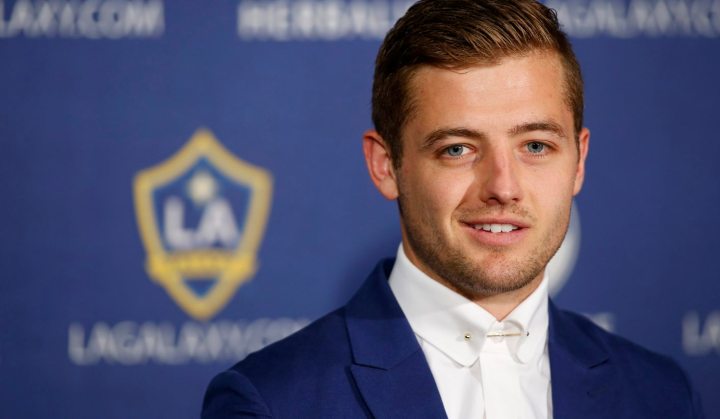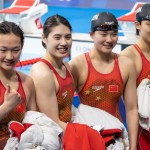Sport
Split opinions over anti-homophobia football campaign

A campaign which encourages football players to wear rainbow laces to raise awareness of homophobia has divided opinion amongst those fighting for equality. What could have been a golden opportunity to unite people is now dividing opinion amongst all those who agree about the essence of it. By ANTOINETTE MULLER.
Sport, we are often told, transcends all boundaries of diversity and inequality. It brings everybody together as they unite in a common cause: their love of their selected game. But not so for a campaign against homophobia in football in Britain, which has split opinions – with some rather naïve PR sending the campaign, essentially, to hell in a handbasket.
Essentially, the campaign is now being seen as promoting the exact thing it should be fighting against. To begin with, gay rights campaigners Stonewall launched an initiative called Right Behind Gay Footballers – intended to be quirky, funny and a bit tongue-in-cheek, but in the end perceived rather differently.
The language used for the campaign has been criticised by Football v Homophobia (FvH), who also aim to improve education around the subject.
“We applaud the sentiments behind the idea central to the ‘Rainbow Laces’ campaign, namely solidarity with gay players,” FvH said in a statement.
“[But] we feel it is incongruous to run a campaign aiming to change football culture whilst using language which reinforces the very stereotypes and caricatures that, in the long term, ensure that homophobia persists.”
Homophobia in football is a serious issue. A YouGov study showed that 80% of English fans believe the issue is still present, but only half see it as serious.
Stonewall, backed by a bookmaker, decided to send out rainbow coloured laces to 92 Premier League and Football League clubs and urge members to wear them to show their support and raise awareness. They did so without consulting the Premier League – so the laces arrived and a few clubs were left confused.
Many clubs chose not to wear the laces while support was scattered elsewhere. Everton had a few players wear them, Joey Barton wore them. Yet in May this year, Barton was banned for two games after referring to another player as “an overweight ladyboy” on Twitter. However, Barton was very vocal in his support, saying: “Join the rainbow laces movement. Sexuality in sport should not be an issue in the 21st century.”
This perhaps underlined the double standard that still exists when it comes to calling people names and this being dismissed as “just banter”. Many clubs sing homophobic chants, with some fans reporting as many as 72% of their opponents’ fans chanting slurs.
“Fairly mild” chants such as “Does your boyfriend know you are here?” and “We can see you holding hands” were common at many grounds. Other cases have been much worse. Brighton supporters have reported being subjected to hearing things like “AIDS” and “faggot” or being singled out and told:“f**king gay see you next Tuesday” while simply trying to hail a taxi. On Twitter, things like: “They’re here, they’re queer, they take it up the rear, Brighton fans, Brighton fans” is an easy go-to for the small-minded minority who confuse “banter” with disrespect.
To put it in context, Brighton is well-known as being one of the largest gay communities in England. Some football fans, who are clearly misdirected, see this as a reason to be abusive and crude.
It is clear, then, that there is a serious need for action. Although, as with racism, something like this is likely to take years before it can be completely eliminated, if it is ever eliminated at all. The tragedy is that while Stonewall had all the right intentions, they seemed to have missed the mark with their campaign slogan, in not approaching the league itself, and in teaming up with Paddy Power.
The company itself is not a saint and has come under fire for marketing a few times. In 2012, the bookmakers had a TV advert suspended after it encouraged viewers to guess the gender of women at the Cheltenham horse racing festival. It also poses a problem for clubs who have other bookmakers as shirt sponsors, and Daniel Storey, writing for Football365.com, has said that perhaps the bookmaker was the architect of the entire campaign’s downfall.
Since the hullabaloo, the Premier League has left it up to individuals to decide whether they want to support the campaign and reiterated that, had they been contacted early on, they might have worked with Stonewall.
“The underlying message behind this campaign is a good one. Indeed, we and our clubs have worked hard with government and other stakeholders to ensure the whole equalities agenda is something we are fully aware of and engaged in.
“However, we were not consulted about this particular campaign. Had we been involved earlier in the process, we could have worked with Stonewall… and would be happy to talk to them in the future to discuss ways in which we could work together,” the Premier League said.
The FA has also taken a similar approach, and while some might criticise their hammering home of keeping their commercial partners happy, one can’t blame them for that view.
“While anti-homophobia messaging is something we are supportive of, our preference is for consultation and involvement from an early stage, especially in consideration of commercial partners and the co-ordination of approaches across the game.”
Stonewall defended their choice in partner, saying that the Irish bookmaker “speaks the language of the fan”. That language, though, is often offensive. It is clear that a conversation needs to be started and action needs to be taken around attitudes in football towards gay people. While Stonewall’s hit-and-miss approach will go long way in making that happen, it’s a pity they missed a golden opportunity to make the most of it. DM
Photo: Los Angeles Galaxy midfielder Robbie Rogers speaks to the media after making his return to professional soccer in the MLS soccer match against the Seattle Sounders in Carson, California May 26, 2013. Rogers is the first openly gay player on a major men’s professional team in North America. REUTERS/Danny Moloshok




















 Become an Insider
Become an Insider